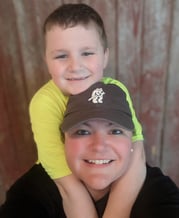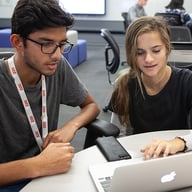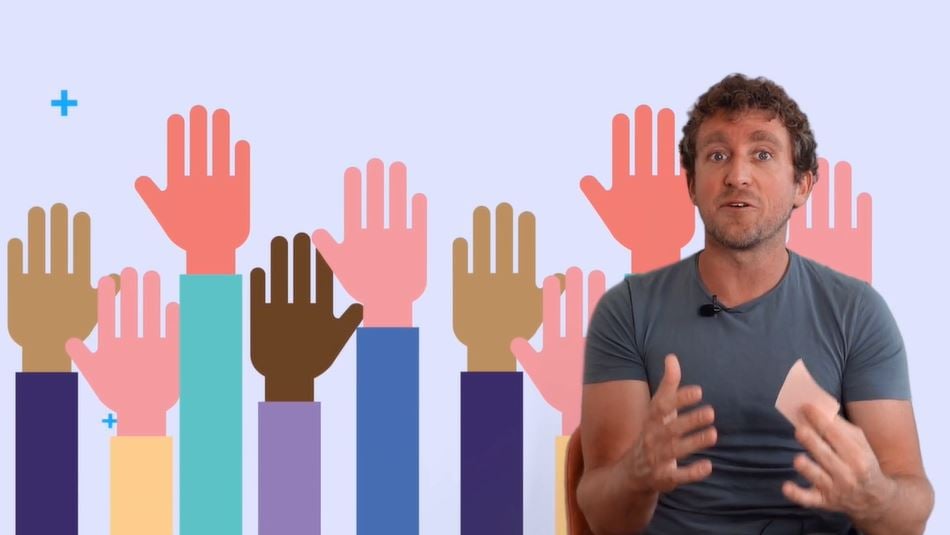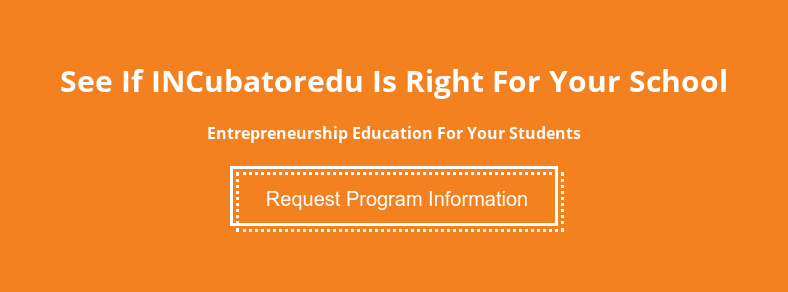As Program Manager for INCubatoredu, Michelle supports our member teachers and is inspired to create and share materials and resources that motivate, engage, and bring 'real' to the curriculum. She is an entrepreneur, designing and selling greeting cards in Whole Foods. She learned these skills by doing, not in her classroom but behind the counter of her family's ice cream shop(every kid's dream, right?). And, she's the mom of two little boys who rarely slow down, ask a lot of questions, and started calling her on her bluffs.
Recently, I had a conversation with my seven-year-old. As we drove away from the pick-up window of his favorite restaurant, he asked me, “Mama, do you have to go to college in order to get a job?”
 I explained that some skills are learned outside of a traditional classroom. I told him that sometimes it was important to not just do school. This phrase is one that I lifted from one of the teachers I support at Uncharted Learning. It means that it is important to be present, not just show up for a grade. Learn. See. Do. Create.
I explained that some skills are learned outside of a traditional classroom. I told him that sometimes it was important to not just do school. This phrase is one that I lifted from one of the teachers I support at Uncharted Learning. It means that it is important to be present, not just show up for a grade. Learn. See. Do. Create.
Dots Not Connecting
When I was seven, it would have blown my mind to think that when I wasn’t sitting in my school desk, I was still learning. This same idea runs parallel with the idea that my teacher didn’t actually exist outside of the school building. However, given that my son hasn’t been in a ‘traditional classroom’ in over a year due to the global pandemic, this idea did not phase him. However, he struggled connecting the dots. Where do I learn these other skills? How do I learn these other skills?
Here's what I want to know, Mama...
We continued the conversation as to what these skills would be and he landed on four main ideas: team management, money management, failure, and empathy. To be fair, in first-grade vocabulary, the ideas were:
- I won’t be able to do everything at the restaurant and will need to ask for help
- I need to count money people give me but not keep it because that is stealing
- I’m probably going to make mistakes. I’m kind of clumsy, so I might drop food
- When I drop the food, people may get mad at me and I’ll need to figure out what will make them feel better
.png?width=166&name=Michelle%26andrew2%20(3).png) My seven-year-old is a black belt in Taekwondo, so I find comfort knowing he learns great life skills through this art. However, other than Taekwondo, and too much time logged on video games (hangs head in parenting shame), school is his go-to. So how does he not just do school while he actually is at school?
My seven-year-old is a black belt in Taekwondo, so I find comfort knowing he learns great life skills through this art. However, other than Taekwondo, and too much time logged on video games (hangs head in parenting shame), school is his go-to. So how does he not just do school while he actually is at school?
What was then, doesn’t have to be what’s now
When I was in high school, I didn’t have a chance to take a high school business class, let alone a business class involving experiential learning. My elective was computer programming. I learned from a book, I wrote code, and I crossed my fingers the program would run without error. Then I packed up and went home.
To think I could learn skills like the ones my son mentioned in an elective class was beyond me at that time. Looking back, I see how essential these skills are for life and the necessity to create a foundation of learning around these areas early on.
In fact, we all are now aware of the importance of these life skills. Technology and 'hard' skills are often top-of-mind when thinking about skills that are in high demand in the future of work, but employer expectations are also surprisingly in the arena of 'human skills'.
This isn't a standard high school business class
Entrepreneurship can be an effective framework for 21st-century skill-building. The high school entrepreneurship program that I manage at Uncharted Learning, INCubatoredu, does just this. In INCubatoredu high school entrepreneurship, we don’t just do school. We do life. We do business. We do failure. We do learning.
As part of membership, our member schools have access to robust curriculum and a ton of materials to support an experiential, real-world learning environment. Here are a few examples that would speak to Andrew's 'wish list' for skill building.
Team Management
The grumbles are always present when a teacher mentions group work, right? However, group work is the very foundation of life. Whether at one’s job or in the home, it is not uncommon to have to work with others. To be effective, it is important to establish group norms and have psychological safety within a group. Our students form teams to create businesses and establish these important protocols. Check out a recent video we created to help address how typical protocols may vary in a remote environment.
(click to play video)
Money Management
Our students are working with real scenarios and real cash, where and when appropriate. What better way to understand the importance of managing money! But one of the most critical pieces to our financial curriculum is the lesson we shared at a professional development event for our educators: “[Financials are] not meant to be plugged in and walk away, [they are] meant to get the clay on the wheels so [you] can shape it.” Teaching students the dynamic nature of money will be a skill they will carry throughout life.
Failure
 So often, we strive for perfection. But we forget that perfection is a journey, not a destination. The path to perfection is often messy, uncomfortable, and involves failure. And if we don’t experience failure, we can’t get better and we can’t appreciate success. In school, failure is perceived by most as a sign of weakness. But instead of thinking about it that way, consider how failure presents an opportunity to learn, pivot, and ultimately build resilience. Here's more from educator and business leaders on this topic (webinar excerpt). Here’s a blog post where students share ‘failure to success’ stories.
So often, we strive for perfection. But we forget that perfection is a journey, not a destination. The path to perfection is often messy, uncomfortable, and involves failure. And if we don’t experience failure, we can’t get better and we can’t appreciate success. In school, failure is perceived by most as a sign of weakness. But instead of thinking about it that way, consider how failure presents an opportunity to learn, pivot, and ultimately build resilience. Here's more from educator and business leaders on this topic (webinar excerpt). Here’s a blog post where students share ‘failure to success’ stories.
Empathy
Empathy brings back the old adage, walk a mile in someone else’s shoes. While this phrase has been around for some time, the question has to be asked, “how often is this practiced?” Using the word practice here is very intentional. Empathy is a skill that must be practiced in order to master the skill effectively and, ideally, subconsciously. In the very first units of our INCubatoredu curriculum, we have students put this adage to work through customer interviews. Students have intentional learning time on the importance of empathy and how to practice it in order to better understand customers and their motivation.
Education for Life
We create programs that provide students with relevant, authentic, and rigorous experiences to prepare them for what comes next after school. We give them the tools, confidence, and curiosity to empower them far beyond any classroom setting. Andrew can't wait!

